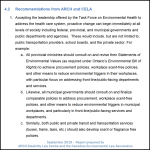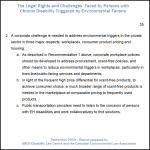…
Severe sensitivity to household chemicals leaves GTA man
homeless for the holidays
Environmental sensitivities have forced Oliver Zhang to move 70 times in 3 years
I hope that someone can offer or help create a safe place for Oliver Zhang to live.
I also hope that something is done soon to ensure safe, affordable, accessible, non-toxic, mold-free, housing is available for all the other people who have MCS/ES (a condition, not disorder) who need safe and accessible housing.
Since finding a safe place to rest one’s head and body is so challenging, even in the best of current circumstances, Oliver Zhang should not be forced to leave the shelter where he is currently residing if it is physically safe enough for him to be there. He is in crisis.
Forcing people onto the streets creates preventable trauma and mental health problems in addition to the serious challenges that already exist when trying to survive with MCS/ES in a society full of systemic accessibility barriers.
I know of many people who have had to move numerous (even countless) times in their quest to find housing that doesn’t hurt and disable them. I hear from too many who are in crisis, seeking accessible housing. I know people who no longer have the energy to keep looking for a needle in a haystack, because each toxic haystack leaves them more and more incapacitated. I know people with MCS/ES who are sleeping in cars and tents, and I have also known more than a few people who weren’t able to find safe housing and are no longer with us.
This is a preventable crisis.
Oliver Zhang and all the other people who are homeless due to the lack of accessible housing for people with MCS/ES, have been put into this position due to systemic neglect (if not deliberate discrimination) and bad policies, not through any fault of their own.
The City of Toronto has known about the critical need for accessible housing for people with MCS/ES since at least 2007, and most likely long before.
In 2008:
“The City of Toronto has launched a consultation process on the development of the City’s ten-year affordable housing plan, known as Housing Opportunities Toronto (“HOT”); and
Continue reading →









